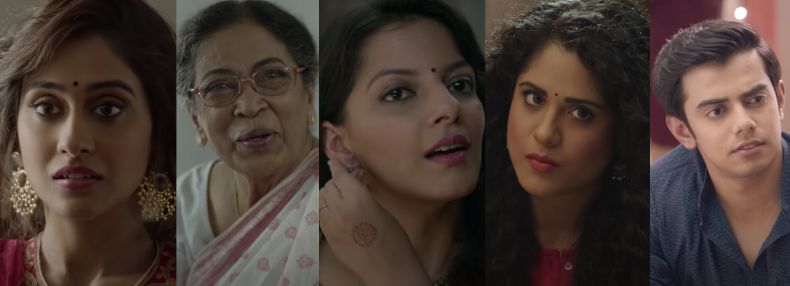
Yesterday, Hindustan Unilever’s Dove made a splash with its new ‘Stop The Beauty Test’ campaign that seems to be calibrated to move the conversation away from pH balance 🙂
For the uninitiated, Sebamed trounced Dove (and other soaps from the HUL repertoire, besides Wipro’s Santoor) recently with their pH-based questions. HUL went to Court twice to get Sebamed to stop the campaign, but lost both times!
Dove’s campaign is well-intended and does make good use of the front-page print real-estate.




That they had even coordinated regional language versions (and online video) showcases good thought and planning.

I do, however, wonder what this does to the Dove brand. This message works several layers above the brand, though within the contours of the brand’s iconic ‘real beauty’ theme. Would this make young girls in India consider Dove products, assuming it inspired them to be self-confident?
Ironically, I assume some of the mothers and aunts mentioned would also give the young girl Dove soap/shampoo to groom her.

Some lines are impactful – I loved, “They will try to match the colour of your skin to the colour of their expectations”!
But, I also found niggling use of the comma: “Your beauty is not a decision someone else can make” and “Your marriage is not a test your beauty has to pass” are normal, flowing sentences. The comma after “decision” and “beauty” breaks the flow unnaturally.
And, interesting choice of names/cities per edition!
- Ahmedabad – Mumbai girl
- Bengaluru, Chennai, Goa, Hyderabad, Jaipur, Kochi & Pune – Bengaluru girl
- Bhopal, Chandigarh, Delhi, Lucknow & Mumbai – Delhi girl
- Kolkata – Nowgong (Assam) girl

There also seems to be an inordinate focus on marriage as an end goal for women – the whole framing seems to be driving towards marriage-related presentability, as if that is the only purpose of ‘beauty’! Focus on beauty is understandable given that the product is meant for that purpose, but it’s almost as if Dove has taken it for granted that marriage — arranged marriage, at that, to be specific — is the crux of life for a woman/girl and within that limitation, they pitch their change in conversation and aid, to whatever extent possible, a shift in thinking.
That attempt in changing the conversation, or at least initiating alternate points of view that challenge existing (regressive) stereotypes (of beauty) reminded me of another brand’s relentless effort a few years ago that focused on marriage too, but from a different perspective.
Fashion brand BIBA has a set of 5 films by the agency Brandmovers (that ended in 2018) that centered around weddings, but the marriage was not central to the plots – they were merely the backdrop to expand on 5 different thematic concepts that push the boundaries of what we are conditioned to believe. The wedding backdrop makes good sense for the brand, in an indirect manner, given the use of the products around weddings as an occasion.
BIBA launched its first ‘Change’ series film in December 2015 with ‘Change The Convention’.
Like Dove, the setting is an arranged marriage and the boy has come to see the girl, with his family. The girl is, of course, Regina Cassandra, who is active in South Indian films currently, but has also acted in Hindi films like Ek Ladki Ko Dekha To Aisa Laga. Unlike’s Dove’s framing, the question of beauty doesn’t materialize at all.
However, the girl’s dad puts forward an interesting proposition where the shift in thinking happens. How the boy and his family handle it is where the film really shines – the writing is smart, thoughtful and definitely goes past regressive stereotypes.
The second film in the series, from March 2016, aimed to ‘Change The Conversation’.
The context was a potential wedding, and families meeting each other. But the focus was around dowry, and it was put down in a graceful and emphatic manner with good use of smart humor!
The third film, from May 2016, is also centered around a marriage, but this one merely grazes over the topic.
Unlike Dove’s framing, this one has a girl emphatically telling her mother (who is asking her, “Aren’t you going to get married or not?”), “Of course, I’d like to get married, but when I want to!”. This film is where the conversation is really pushing the boundaries that the Dove’s film doesn’t.
The fourth film, from August 2017, uses a very familiar, everyday question from a young mother that could have easily been part of Dove campaign! This one hits really close to Dove’s real beauty theme!
The final film is my favorite. Launched in March 2018, it captures wonderfully the premise of ‘Why ask a woman what you wouldn’t ask a man?’. On the part of the boy, there wasn’t any vocal provocation to show that he deserved that question, though you could argue that his body language and tone indicated that. But, this one makes its point brilliantly!
While we could look Dove’s campaign as ‘We would take whatever little progressive conversation we can’, I do think they are playing in a very small pool, for such a large issue. It feels like Dove has accepted that this is the way marriages are going to be (based on current realities) and inside the narrow space, they are trying to change some amount of thinking.
On the other hand, BIBA, through its 5-films series, significantly pushes the status quo. I do hope they go to this theme again and make more films in the series.
